- Home
- Clarice Lispector
Complete Stories Page 2
Complete Stories Read online
Page 2
Her law studies left little mark. She was already pursuing her vocation into the newsrooms of the capital, where her beauty and brilliance made a dazzling impression. She was, her boss wrote, “a smart girl, an excellent reporter, and, in contrast to almost all women, actually knows how to write.” On May 25, 1940, she published her earliest known story, “The Triumph.” Three months later, age fifty-five, her father died.
Before her twentieth birthday, then, Clarice was an orphan. In early 1943, she married a Catholic, unheard-of for a Jewish girl in Brazil. At the end of that year, shortly after she published her first novel, she and her husband left Rio de Janeiro. In short order, therefore, she left her family, her ethnic community, and her country. She also left her profession, journalism, in which she had a burgeoning reputation.
She found exile intolerable, and during her fifteen years abroad her tendency toward depression grew sharper. But despite its disadvantages, perhaps exile — this series of exiles — explains how she managed to write.
Her immigrant background left her less susceptible to the received ideas of Brazilian society. And in purely financial terms, her marriage was a step up. She was never rich, but as long as she was married she did not have to work on anything but writing. It is hard to imagine her creating the complex works of this period — three novels and the stories of Family Ties — amidst the relentless demands and meager paychecks of full-time journalism. She had two children, but she also had full-time help. This meant free hours every day: a room of her own.
This would have been the case for any Brazilian woman of the class she married into. Why, then, did so few develop their talents? Most were trapped inside the structures that blocked women everywhere: lack of education and forced motherhood topped the list. But they were also blocked by a generalized unconcern with what they might have to say, an unspoken attitude that women didn’t do certain things. To be a foreigner, on the other hand, meant an exemption from the normal ways of doing things. It was a productive cultural alienation, and the other side of alienation is freedom. Clarice’s experience of both resonates throughout her life.
Traditionally “female” subjects — marriage and motherhood, kids and clothes — had, of course, been treated before. They are all here. But alongside them the little dramas of women’s lives gain expression, sometimes for the first time: the tedium and the covert joys of the average housewife; the young woman’s delight in her beauty, and her subsequent discovery of the horrors the mirror holds: her face deformed by makeup; her body getting fat; her body growing old. Had any writer ever described a seventy-seven-year-old lady dreaming of coitus with a pop star, or an eighty-one-year-old woman masturbating? Half a century or more after they were written, many of these stories, read in an entirely different age, have lost none of their novelty, none of their power to shock.
In dance as in music, in painting as in literature, the great artist is one who uses the tiniest details — the brushstroke, the grace note, the turn of foot or phrase — to create a whole that, though made of these details, nonetheless surpasses their sum. As Clarice Lispector’s reputation is more than the achievement of her individual works, so does there emerge from the portraits in these stories — short as well as long, addressing both fleeting moments and great crises — a master-narrative of human experience: of the dramas, big and small, that make up a person’s life. Shortly before she died, a critic asked Clarice whether two plus two equaled five:
For a second I was speechless. But then a darkly humorous anecdote sprang to mind: It goes like this: the psychotic says that two plus two equals five. The neurotic says: two plus two equals four but I just can’t take it.
New subjects require new language. Part of Clarice’s odd grammar can be traced to the powerful influence of the Jewish mysticism to which she was introduced by her father. But another part of its strangeness can be attributed to her need to invent a tradition. As anyone who reads these stories from beginning to end will see, they are shot through by a ceaseless linguistic searching, a grammatical instability, that prevents them from being read too quickly.
The reader — not to mention the poor translator — is often tripped up by their nearly Cubist patterns. In certain late stories, the difficulties are obvious. But many of Clarice’s reorderings are so subtle that one not paying close attention can easily miss them. This makes them extremely difficult to reproduce and also explains, in part, their poetic appeal. In “Love,” for example, we read: “They were growing up, taking their baths, demanding for themselves, misbehaved, ever more complete moments.” The sentence, like so many of Clarice’s, makes sense if read in a quick glance — and then, examined again, slowly, begins to dissolve. In “Happy Birthday,” amidst an awkward celebration, a child verbalizes an awkward pause: “Their mother, comma!”*
In Why This World: A Biography of Clarice Lispector, I examined her roots in Jewish mysticism and the essentially spiritual impulse that animated her work. As the Kabbalists found divinity by rearranging letters, repeating nonsensical words, parsing verses, and seeking a logic other than the rational, so did Clarice Lispector. With several exceptions (“The Egg and the Chicken,” “Brasília,” “Dry Study of Horses”), this mystic quality, which can make her prose nearly abstract, is less visible here than in novels such as The Passion According to G. H. or The Apple in the Dark. But to see Clarice Lispector’s writing as a whole is to understand the close connection between her interest in language and her interest in what — for lack of a better word — she called God.
In these stories, the divine erupts beneath carefully tended everyday lives. “She had pacified life so well,” she writes in one story, “taken such care for it not to explode.” When the inevitable explosions come, shifts in grammar announce them long before they explicitly appear in the plot. Laura, the bored, childless housewife in “The Imitation of the Rose,” has a “painstaking taste for method” — until her grammar starts to slide.
Carlota would be stunned to learn that they too had a private life and things they never told, but she wouldn’t tell, what a shame not to be able to tell, Carlota definitely thought she was just tidy and mundane and a little annoying, and if she had to be careful not to burden other people with details, with Armando she’d sometimes relax and get pretty annoying, which didn’t matter because he’d pretend to be listening without really listening to everything she was telling him, which didn’t ever bother her, she understood perfectly well that her chattering tired people out a bit, but it was nice to be able to explain how she hadn’t found any meat even if Armando shook his head and wasn’t listening, she and the maid chatted a lot, actually she talked more than the maid, and she was also careful not to pester the maid who sometimes held back her impatience and could get a little rude, it was her own fault because she didn’t always command respect.
These signals can be much more concise, as in The Passion According to G. H., when another housewife recounts the mystical shock she underwent the day before. Remembering herself as she then was, G. H. says:
I finally got up from the breakfast table, that woman.
The transformation described in the novel — then to now — yesterday to today — her to me — first person to third — is resumed in a breezy anacoluthon, the break in grammar perfectly symbolizing the break in this woman’s life. Like so many of Clarice’s best phrases, it is elegant precisely because it disregards the mannered conventions that are the elegance of belles lettres.
“In painting as in music and literature,” Clarice Lispector wrote, “what is called abstract so often seems to me the figurative of a more delicate and difficult reality, less visible to the naked eye.” The effort to supersede apparently inevitable structures animated modern art. As abstract painters sought to portray mental and emotional states without direct representation, and modern composers expanded traditional laws of harmony, Clarice undid reflexive patterns in grammar. She often had to remind readers that her “forei
gn” speech was not the result of her European birth or an ignorance of Portuguese. One of the most highly educated women of her generation was no more ignorant of the standard Brazilian language than Schoenberg was of the diatonic scale, or Picasso of anatomy.
Nor, needless to say, of the proper ways women presented themselves. As a professional fashion writer, she reveled in her characters’ appearances. And then she disheveled their dresses, smudged their mascara, deranged their hair, enchanting well-composed faces with the creepier glamour Sir Walter Scott described. With overturned words, she conjured an entire unknown world — conjuring, too, the unforgettable Clarice Lispector: a female Chekhov on the beaches of Guanabara.
BENJAMIN MOSER
* * *
* Following the hardcover publication of this essay, a Brazilian friend pointed out that this interjection can also mean “Sure!” or “Right!” Clarice Lispector delighted in odd uses of words and in unorthodox punctuation, so it seems likely that both meanings were intended.
FIRST STORIES
The Triumph
(“O triunfo”)
The clock strikes nine. A loud, sonorous peal, followed by gentle chiming, an echo. Then, silence. The bright stain of sunlight lengthens little by little over the lawn. It goes climbing up the red wall of the house, making the ivy glisten in a thousand dewy lights. It finds an opening, the window. It penetrates. And suddenly takes possession of the room, slipping past the light curtains standing guard.
Luísa remains motionless, sprawled atop the tangled sheets, her hair spread out on the pillow. An arm here, another there, crucified by lassitude. The heat of the sun and its brightness fill the room. Luísa blinks. She frowns. Purses her lips. Opens her eyes, finally, and leaves them fixed on the ceiling. Little by little the day enters her body. She hears a sound of dry leaves crunching underfoot. Footsteps in the distance, tiny and hurried. A child is running down the main road, she thinks. Once more, silence. She amuses herself a moment listening to it. It is absolute, like the silence of death. Naturally since the house is remote, rather isolated. But . . . what about those domestic noises of every morning? The sound of footsteps, laughter, the clattering of dishes that announce the start of the day in her house? Slowly the idea crosses her mind that she knows the reason for the silence. She pushes it away, though, stubbornly.
Suddenly her eyes widen. Luísa finds herself sitting up in bed, a shiver coursing throughout her body. She looks with her eyes, her head, her every nerve, at the other bed in the room. It’s empty.
She props her pillow up vertically, leans against it, head tilting back, eyes closed.
It’s true, then. She thinks back to the previous afternoon and night, the tortured, long night that followed and dragged on until dawn. He left, yesterday afternoon. He took his bags with him, the bags that just two weeks ago had come home festively covered in labels from Paris, Milan. He also took the manservant who had come with them. The silence in the house was explained. She’d been alone, ever since his departure. They had fought. She, silent, before him. He, the refined, superior intellectual, yelling, accusing her, pointing his finger at her. And that feeling she’d already experienced during their other fights: if he leaves, I’ll die, I’ll die. She could still hear his words.
“You, you trap me, you annihilate me! Keep your love, give it to someone who wants it, someone who has nothing better to do! Got it? Yes! Ever since I met you I haven’t produced a thing! I feel tied down. Tied down by your fussing, your caresses, your excessive zeal, by you yourself! I despise you! Think about that, I despise you! I . . .”
These explosions happened often. There was always the threat of his leaving. Luísa, at that word, would transform. She, so full of dignity, so ironic and sure of herself, would beg him to stay, with such pallor and madness in her face, that he’d given in every other time. And happiness would flood her, so intense and bright, that it compensated for what she’d never imagined was a humiliation, but that he’d make her see with ironic arguments, which she wouldn’t even hear. This time he’d lost his temper, as he had every other time, for almost no reason. Luísa had interrupted him, he said, right when a new idea was stirring, luminous, in his brain. She’d cut off his inspiration at the very instant it was springing forth, with a silly comment about the weather, and concluding with a loathsome: “isn’t it, darling?” He said he needed the proper conditions in order to produce, to continue his novel, nipped in the bud by an absolute inability to concentrate. He’d gone off somewhere to find “the atmosphere.”
And the house had been left in silence. She, stuck in the bedroom, as if her entire soul had been removed from her body. Waiting, to see him reappear, his manly form framed in the doorway. She’d hear him say, his beloved broad shoulders shaking with laughter, that it was all just a joke, just an experience to insert into a page of the book.
But the silence had dragged on infinitely, punctured only by the monotonous hiss of the cicadas. The moonless night had gradually invaded the room. The cool June breeze made her shiver.
“He’s gone,” she thought. “He’s gone.” Never had this expression struck her as so full of meaning, though she’d read it many times before in romantic novels. “He’s gone” wasn’t that simple. She dragged around an immense void in her head and chest. If anyone were to bang on them, she imagined, they’d sound metallic. How would she live now? she suddenly asked herself, with an exaggerated calm, as if it were some neutral thing. She kept repeating and repeating: what now? She cast her eyes around the gloomy bedroom. She switched on the light, looked for his clothes, his book on the nightstand, traces of him. Nothing left behind. She got scared. “He’s gone.”
She’d tossed and turned in bed for hours and hours and sleep hadn’t come. Toward dawn, weakened by wakefulness and pain, eyes stinging, head heavy, she fell into a semi-unconsciousness. Not even her head stopped working, images, the maddest kind, ran through her mind, barely sketched out and already fleeting.
It strikes eleven, long and leisurely. A bird lets out a piercing cry. Everything has stood still since yesterday, thinks Luísa. She’s still sitting up in bed, stupidly, not knowing what to do. Her eyes fix on a seascape, in cool colors. Never had she seen water give quite that impression of liquidness and movement. She’d never even noticed the painting. Suddenly, like a dart, wounding sharp and deep: “He’s gone.” No, it’s a lie! She stands. Surely he got angry and went to sleep in the next room. She runs, pushes the door open. Empty.
She goes to the desk where he used to work, rifles feverishly through the abandoned newspapers. Maybe he’s left some note, saying, for instance: “In spite of everything, I love you. I’ll be back tomorrow.” No, today! All she finds is a piece of paper from his notepad. She turns it over. “I’ve been sitting here for two solid hours and still haven’t been able to focus my attention. Yet, at the same time, I’m not focusing it on anything around me. It has wings, but doesn’t land anywhere. I just can’t write. I just can’t write. With these words I’m scratching at a wound. My mediocrity is so . . .” Luísa breaks off reading. What she’d always felt, only vaguely: mediocrity. She’s absorbed. So he knew it, then? What an impression of weakness, of faintheartedness, on that simple piece of paper . . . Jorge . . . , she murmurs feebly. She wishes she hadn’t read that confession. She leans against the wall. Silently she cries. She cries until she feels limp.
She goes to the sink and splashes her face. Sensation of coolness, release. She’s waking. She perks up. Braids her hair, pins it up. Scrubs her face with soap, until her skin feels taut, shiny. She looks at herself in the mirror and resembles a schoolgirl. She tries to find her lipstick, but remembers in time that she no longer needs it.
The dining room lay in darkness, humid and stuffy. She throws open the windows. And the brightness penetrates all at once. The new air enters swiftly, touches everything, ripples the sheer curtains. Even the clock seems to strike more vigorously. Luísa halts in surprise
. So much is charming about this cheerful room. About these things suddenly brightened and revived. She leans out the window. In the shadow of that line of trees, ending a long way down the red clay road . . . In fact she hadn’t noticed any of this. She’d always lived there with him. He was everything. He alone existed. He was gone. And things hadn’t entirely lost their charm. They had a life of their own. Luísa ran her hand over her forehead, she wanted to push away her thoughts. From him she had learned the torture of ideas, plunging deeper into their slightest particulars.
She made coffee and drank it. And since she had nothing to do and was afraid of thinking, she took some clothes lying out to be washed and went to the back of the yard, where there was a large sink. She rolled up her pajama sleeves and pants and started scrubbing everything with soap. Bent over like that, moving her arms vehemently, biting her lower lip from the effort, the blood pulsing strong throughout her body, she surprised herself. She stopped, unfurrowed her brow and stood staring straight ahead. She, so spiritualized by that man’s company . . . She seemed to hear his ironic laugh, quoting Schopenhauer, Plato, who thought and thought . . . A sweet breeze made the hairs on the back of her neck rise, dried the suds on her fingers.
Luísa finished the chore. Her whole body gave off the rough, plain scent of soap. The work had warmed her up. She looked at the large spigot, gushing clear water. She felt a wave of heat . . . Suddenly an idea came to her. She took off her clothes, opened the spigot all the way, and the cold water coursed over her body, making her shriek at the cold. That improvised bath made her laugh with pleasure. Her bathtub took in a marvelous view, beneath an already blazing sun. For a moment she became serious, still. The novel unfinished, the confession discovered. She became lost in thought, a wrinkle on her brow and at the corners of her lips. The confession. But the water was flowing cold down her body and noisily clamoring for her attention. A good heat was now circulating through her veins. Suddenly, she had a smile, a thought. He’d be back. He’d be back. She looked around at the perfect morning, breathing deeply and feeling, almost with pride, her heart beating steadily and full of life. A warm ray of sunshine enveloped her. She laughed. He’d be back, because she was the stronger one.

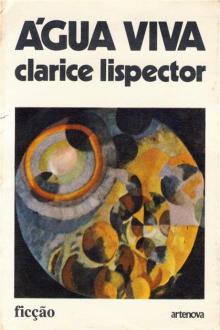 The Stream of Life
The Stream of Life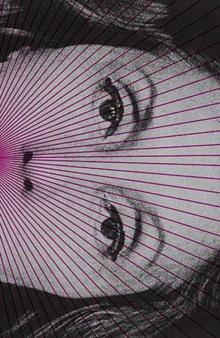 The Complete Stories
The Complete Stories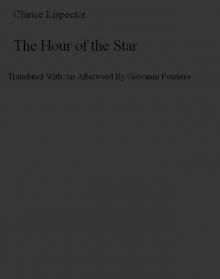 The Hour of the Star
The Hour of the Star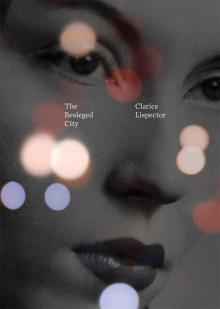 The Besieged City
The Besieged City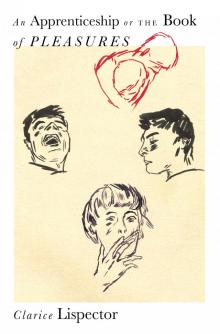 An Apprenticeship or the Book of Pleasures
An Apprenticeship or the Book of Pleasures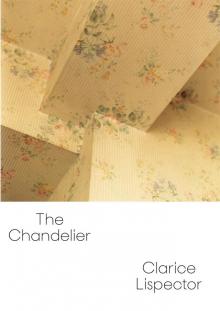 The Chandelier
The Chandelier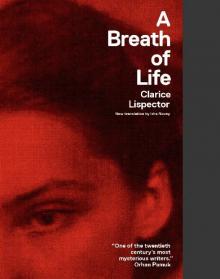 A Breath of Life
A Breath of Life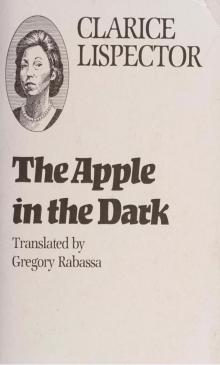 The Apple in the Dark
The Apple in the Dark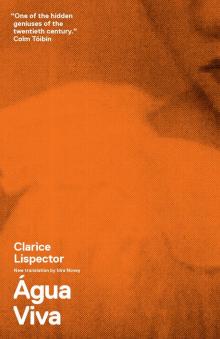 Agua Viva
Agua Viva Complete Stories
Complete Stories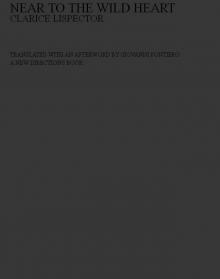 Near to the Wild Heart
Near to the Wild Heart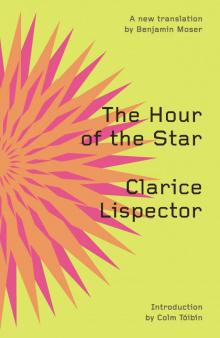 The Hour of the Star ()
The Hour of the Star ()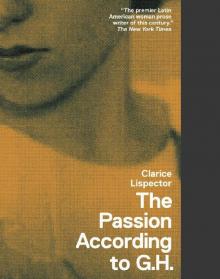 The Passion According to G.H.
The Passion According to G.H.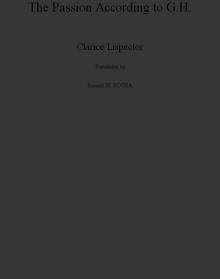 The Passion According to GH
The Passion According to GH